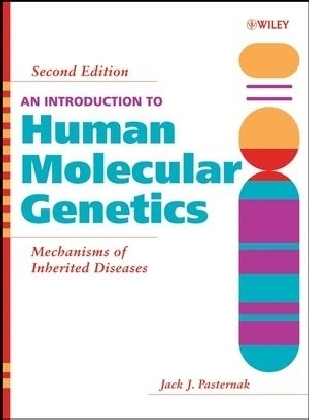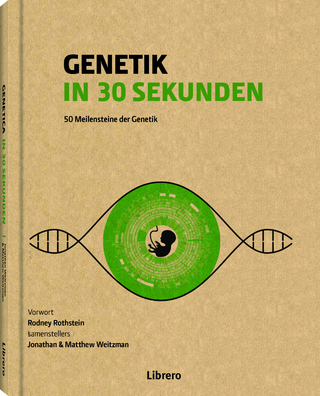
An Introduction to Human Molecular Genetics
Wiley-Liss Inc.,U.S. (Verlag)
978-0-471-47426-5 (ISBN)
- Lieferbar (Termin unbekannt)
- Versandkostenfrei innerhalb Deutschlands
- Auch auf Rechnung
- Verfügbarkeit in der Filiale vor Ort prüfen
- Artikel merken
An Introduction to Human Molecular Genetics
Second Edition
Jack J. Pasternak
The Second Edition of this internationally acclaimed text expands its coverage of the molecular genetics of inherited human diseases with the latest research findings and discoveries. Using a unique, systems-based approach, the text offers readers a thorough explanation of the gene discovery process and how defective genes are linked to inherited disease states in major organ and tissue systems. All the latest developments in functional genomics, proteomics, and microarray technology have been thoroughly incorporated into the text.
The first part of the text introduces readers to the fundamentals of cytogenetics and Mendelian genetics. Next, techniques and strategies for gene manipulation, mapping, and isolation are examined. Readers will particularly appreciate the text's exceptionally thorough and clear explanation of genetic mapping. The final part features unique coverage of the molecular genetics of distinct biological systems, covering muscle, neurological, eye, cancer, and mitochondrial disorders. Throughout the text, helpful figures and diagrams illustrate and clarify complex material.
Readers familiar with the first edition will recognize the text's same lucid and engaging style, and will find a wealth of new and expanded material that brings them fully up to date with a current understanding of the field, including:
* New chapters on complex genetic disorders, genomic imprinting, and human population genetics
* Expanded and fully revised section on clinical genetics, covering diagnostic testing, molecular screening, and various treatments
This text is targeted at upper-level undergraduate students, graduate students, and medical students. It is also an excellent reference for researchers and physicians who need a clinically relevant reference for the molecular genetics of inherited human diseases.
Dr. Jack J. Pasternak received his Ph.D. from Indiana University and is now Professor Emeritus at the University of Waterloo. He has authored or co-authored several textbooks, including Molecular Biotechnology: Principles and Applications of Recombinant DNA.
Preface xvii
Preface to the First Edition xix
Chapter 1 Understanding Human Disease 1
Human Genetic Disease 2
Human Genetics from 1900 to 1957 5
Eugenics: Genetics Misinterpreted 9
The Molecularization of Genetics 11
Genes and Phenotypes 12
OMIM: An Important Online Source of Information About Human Genetic Disorders 14
Key Terms 17
Summary 17
References 18
Review Questions 18
Chapter 2 The Genetic System: Chromosomes 19
Human Chromosomes 19
Maintaining the Chromosome Number 19
Cell Division Cycle: The Mitotic Process 20
The Meiotic Process 22
Characterizing Human Chromosomes 24
Chromosome Abnormalities 28
Whole Chromosome Changes: Aneuploidy 28
Chromosome Structural Changes 30
Determining the Phases of the Cell Cycle 32
Key Terms 35
Summary 35
References 36
Review Questions 36
Chapter 3 The Genetic System: Mendel’s Laws of Inheritance and Genetic Linkage 37
Dominance, Recessiveness, and Segregation 38
Independent Assortment 41
Genetic Linkage 44
Constructing Genetic Maps 47
Three-Point Cross 48
Chi-Square Distribution: Testing for Significance 52
Multiple Alleles 54
Human Genetics 55
Autosomal Dominant Inheritance 58
Autosomal Recessive Inheritance 59
X-Linked Inheritance 60
Using Pedigrees to Study Human Genetic Disorders 61
Calculating Mendelian Frequencies 65
Detection and Estimation of Genetic Linkage in Humans 66
The Logarithm of the Likelihood Ratio Method of Linkage Analysis: LOD Score 67
Key Terms 71
Summary 72
References 72
Review Questions 73
Chapter 4 The Molecular Biology of the Gene 75
Properties of Genetic Material 75
Structure of DNA 76
DNA Replication 79
Decoding Genetic Information: RNA and Protein 79
Translation 85
Regulation of mRNA Transcription 89
Hemoglobinopathies and Thalassemias: An Abundance of Mutations 92
Nucleotide Sequence Alteration: Mutation 94
Mutations of Structural Genes 95
Nomenclature for Mutations 100
Dominant Mutations and Genetic Disorders 102
Key Terms 104
Summary 104
References 105
Review Questions 106
Chapter 5 Recombinant DNA Technology 107
Restriction Endonucleases 108
Cloning Vectors 115
Plasmid Cloning Vector pUC 19 116
Screening DNA Constructs by DNA Hybridization 119
In Situ Hybridization 122
Chemical Synthesis of DNA 122
Sequencing DNA 124
Polymerase Chain Reaction 130
Human-Rodent Somatic Cell Hybrids 131
Human DNA Libraries 137
Genomic Libraries 137
Chromosome DNA Libraries 139
Multicolor Karyotyping: Coloring Chromosomes 143
Region-Specific Chromosome Libraries 144
Constructing a cDNA Library 145
Key Terms 149
Summary 149
References 151
Review Questions 151
Chapter 6 Genetic and Physical Mapping of the Human Genome 153
Genetic Mapping of Human Chromosomes 153
Genetic Polymorphism 153
Restriction Fragment Length Polymorphism 155
Short Tandem Repeat Polymorphism 158
Mapping of a Genetic Disease Locus to a Chromosome Location 159
Multilocus Mapping of Human Chromosomes 163
Inserting a Disease Gene into a Linkage Map 165
Homozygosity Mapping 168
Linkage Disequilibrium Mapping 169
Radiation Hybrid Mapping 171
Genotyping Single-Nucleotide Polymorphisms 174
Physical Mapping of the Human Genome 181
Assembling Contigs from BAC Libraries 181
Comparative Genetic Maps 182
Integration of Cytogenetic, Genetic, and Physical Maps 184
Key Terms 186
Summary 186
References 186
Review Questions 187
Chapter 7 Discovering Human Disease Genes 189
Cloning Human Disease Genes 190
Functional/Candidate Gene Cloning 190
Positional-Candidate Gene Cloning 191
Detection of Mutations in Human Genes 191
Single-Strand Conformation Polymorphism Analysis 191
Denaturing Gradient Gel Electrophoresis 193
Heteroduplex Analysis 193
Rapid Detection of Unknown Mutations: Capillary Electrophoresis 197
Chemical Mismatch Cleavage 197
Direct DNA Sequencing 199
Protein Truncation Test 199
Key Terms 201
Summary 202
References 202
Review Questions 202
Chapter 8 Bioinformatics: Genomics, Functional Genomics, and Proteomics 203
Similarity Search of a DNA Database 204
Functional Genomics 207
DNA Microarray Technology 208
Serial Analysis of Gene Expression 211
Proteomics 213
Separation and Identification of Proteins 214
Protein Expression Profiling 217
Protein-Protein Interaction Mapping 219
How Many Genes Do We Have? 220
Key Terms 226
Summary 226
References 227
Review Questions 228
Chapter 9 Human Population Genetics 229
Alleles, Genotypes, and Hardy–Weinberg Equilibrium 230
Hardy–Weinberg Equilibrium with X-Linked Genes 236
Hardy–Weinberg Equilibrium with Two Loci 238
Processes That Alter Allele and Genotype Frequencies in Populations 239
Population Size 239
Genetic Structure of Isolated Human Populations 241
Founder Effect 243
Migration 244
Mating Systems 248
Assortative Mating 248
Inbreeding 250
Effect of Inbreeding on Populations 256
Mutation 260
Fitness and Selection 262
Directional Selection 265
Balancing Selection 269
Disruptive Selection 272
Mutation, Selection, and Founder Effect: A Case Study 273
Dysgenics: Fact or Fiction 276
Coalescence 278
Neutral Theory 279
Testing for Selection 280
Wright’s F ST Statistic 284
Using DNA Polymorphisms to Infer Human History 286
Key Terms 288
Summary 289
References 290
Review Questions 292
Chapter 10 Molecular Genetics of Complex Disorders 295
Phenotypic Variation of Monogenic Disorders 300
Oculocutaneous Albinism Type 1 300
Glucose-6-Phosphate Dehydrogenase Deficiency 301
Cystic Fibrosis 303
Oligogenic Disorders 305
Autosomal Recessive Nonsyndromic Deafness 306
Bardet–Biedl Syndrome 306
Polygenic Inheritance 307
Familial Risk Ratio 309
Twin Studies 311
Locating Quantitative Trait Loci 319
Case-Control Association Studies 319
Genetics of Human Intelligence 320
Genome Scans 321
Transmission/Disequilibrium Test 324
Affected Sib Pair Linkage Analysis 325
Key Terms 327
Summary 327
References 328
Review Questions 330
Chapter 11 Genomic Imprinting: An Epigenetic Modification 333
Parent-of-Origin Effect 333
Gene Silencing 335
Genomic Imprinting and Human Disease 339
Prader–Willi Syndrome 340
Angelman Syndrome 343
X-Chromosome Inactivation 344
Beckwith–Wiedemann Syndrome 345
Key Terms 346
Summary 346
References 347
Review Questions 348
Chapter 12 Molecular Genetics of Mitochondrial Disorders 349
Mitochondria and Oxidative Phosphorylation 349
Mitochondrial Genetics 352
Mitochondrial Disorders 354
Myoclonus Epilepsy and Ragged Red Fibers 355
Mitochondrial Encephalomyopathy with Lactic Acidosis and Strokelike Episodes 355
Leber Hereditary Optic Neuropathy 357
Neuropathy, Ataxia, and Retinitis Pigmentosa 358
Kearns–Sayre Syndrome 358
Nuclear-Encoded Mitochondrial Disorders 359
Mitochondrial Protein Importation Defects 360
Substrate Transport Defects 360
Substrate Utilization Defects 360
Iron Transport Defect 361
Electron Transport Chain Defects 361
Revelations From the Grave: Using Mitochondrial DNA Analysis to Resolve Historical Mysteries 362
Mitochondrial DNA Defects 363
Key Terms 365
Summary 365
References 366
Review Questions 367
Chapter 13 Molecular Genetics of Muscle Disorders 369
Structure of Skeletal Muscle 369
Dystrophin and Associated Muscle Proteins 371
Cardiac and Smooth Muscle 373
Studying Inherited Muscle Disorders 373
Skeletal Muscle Disorders 374
Duchenne Muscular Dystrophy 374
Limb-Girdle Muscular Dystrophy 376
Congenital Muscular Dystrophy 378
Facioscapulohumeral Muscular Dystrophy 380
Cardiac Muscle Disorders 382
Dilated Cardiomyopathy 382
Discovering the DMD Gene 385
Hypertrophic Cardiomyopathy 388
Key Terms 390
Summary 390
References 391
Review Questions 392
Chapter 14 Molecular Genetics of Neurological Disorders 393
Neurons 394
Nonneuronal Cells of the Nervous System 395
Resting Membrane Potential 396
Initiation, Propagation, and Synaptic Transmission of a Nerve Impulse 397
Parts of the Brain 400
Neuronal Channelopathies 402
Alzheimer Disease 403
Biochemistry of Senile Plaques and Neurofibrillary Tangles 405
Genetics of Alzheimer Disease 409
Mutations of the Amyloid Precursor Protein Gene 409
Mutations in the Presenilin Genes 410
Genetic Risk Factor for Alzheimer Disease 411
Huntington Disease and Other Trinucleotide Repeat Expansion Diseases 412
Amyotrophic Lateral Sclerosis 420
Charcot–Marie–Tooth Disease 422
Inherited Prion Diseases 425
Genetically Engineered Animal Models for Studying Inherited Human Disorders 426
Schizophrenia 430
Key Terms 433
Summary 433
References 435
Review Questions 437
Chapter 15 Molecular Genetics of the Eye 439
Human Visual System 440
Structure of the Eye 440
Phototransduction: Conversion of Radiant Energy into Nerve Impulses 442
Studying the Molecular Basis of Inherited Disorders of the Human Eye 444
Genetic Disorders of the Human Eye 445
Corneal Dystrophies 445
Glaucoma 447
Aniridia 450
Cataracts 452
Retinitis Pigmentosa 455
Congenital Stationary Night Blindness 459
Choroideremia 460
Color Vision Defects 461
Searching for the Genetic Basis of Myopia 462
Isolation of Human Rhodopsin and Color Opsin Genes 462
Molecular Genetics of Red and Green Color Vision Defects 463
Blue Cone Monochromacy 466
Blue Color Vision Defects 467
Rod Monochromacy 467
Key Terms 468
Summary 468
References 469
Review Questions 470
Chapter 16 Molecular Genetics of Cancer Syndromes 471
Cell Proliferation and Cancer 472
Signal Transduction Pathway for Cell Proliferation 473
Regulation of the Cell Division Cycle 477
Apoptosis: Programmed Cell Death 480
Tumor Metastasis 481
Oncogenes 482
Alteration of Oncogenes in Cancer Cells 485
Tumor Suppressor Genes 487
Neurofibromatoses 488
Neurofibromatosis Type 1 488
Neurofibromatosis Type 2 490
Breast Cancer 490
Retinoblastoma 493
Wilms Tumor 494
Multiple Endocrine Neoplasia Type 1 495
Multiple Endocrine Neoplasia Type 2 496
Li–Fraumeni Syndrome 498
Colorectal Cancer 500
Familial Adenomatous Polyposis 501
Hereditary Nonpolyposis Colorectal Cancer 503
Philadelphia Chromosome, Two-Hit Hypothesis, and Comparative Genomic Hybridization 504
Bloom Syndrome 509
Xeroderma Pigmentosum 511
Key Terms 514
Summary 514
References 515
Review Questions 516
Chapter 17 Counseling, Diagnostic Testing, and Management of Genetic Disorders 517
Genetic Counseling 518
Diagnostic Testing 519
Principles of Genetic Testing 519
Testing for Genetic Disorders 519
Direct Mutation Detection Methods 521
Clinical Applications of Genetic Tests 526
Bayesian Determination of Recurrent Risks for Genetic Disorders Within Families 528
Screening Programs for Genetic Disorders 535
Treating Genetic Disorders 541
Clinical Features, Diagnosis, and Treatment of Some Genetic Disorders 543
Williams Syndrome 543
Norrie Syndrome (Norrie Disease) 545
Achondroplasia 545
Familial Mediterranean Fever 547
Peutz–Jeghers Syndrome 549
Smith–Lemli–Opitz Syndrome 550
Wilson Disease 552
Protecting Genetic Privacy and Preventing Genetic Discrimination 548
Key Terms 554
Summary 554
References 555
Review Questions 556
Glossary 557
Index 597
| Erscheint lt. Verlag | 15.7.2005 |
|---|---|
| Zusatzinfo | Photos: 5 B&W, 0 Color; Drawings: 254 B&W, 6 Color; Tables: 87 B&W, 0 Color |
| Verlagsort | New York |
| Sprache | englisch |
| Maße | 224 x 287 mm |
| Gewicht | 1796 g |
| Themenwelt | Medizin / Pharmazie ► Medizinische Fachgebiete |
| Naturwissenschaften ► Biologie ► Genetik / Molekularbiologie | |
| ISBN-10 | 0-471-47426-6 / 0471474266 |
| ISBN-13 | 978-0-471-47426-5 / 9780471474265 |
| Zustand | Neuware |
| Haben Sie eine Frage zum Produkt? |
aus dem Bereich


